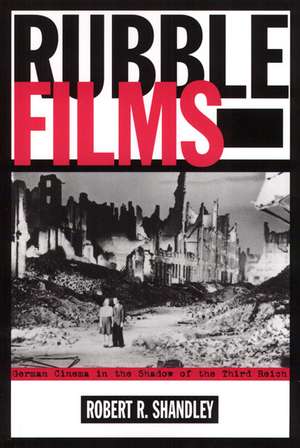Rubble Films: German Cinema in the Shadow of the Third Reich
Autor Robert R. Shandleyen Limba Engleză Hardback – 30 iun 2001
Rubble Films is a close look at German cinema in the immediate postwar era, and a careful examination of its relationship to Allied occupation. Shandley reveals how German film borrowed—both literally and figuratively—from its Nazi past, and how the occupied powers (specifically the US) used its position as victor to open Europe to Hollywood movie products and aesthetics.
Incorporating a careful reading of several important postwar films, Shandley also discusses how the German studio system operated immediately after the war, in the east and the west, giving special focus on DEFA, the east German studio that rose during Soviet occupation.
Pathbreaking in its research, Rubble Films sheds new light on a significant moment of German cultural rebirth, and adds a new dimension to the study of the history of film. Author note:
Robert R. Shandley is Assistant Professor in the Department of Modern and Classical Languages at Texas A&M University, and editor of Unwilling Germans? The Goldhagen Debate.
Preț: 446.79 lei
Preț vechi: 551.59 lei
-19% Nou
Puncte Express: 670
Preț estimativ în valută:
85.49€ • 88.20$ • 71.34£
85.49€ • 88.20$ • 71.34£
Cartea se retipărește
Doresc să fiu notificat când acest titlu va fi disponibil:
Se trimite...
Preluare comenzi: 021 569.72.76
Specificații
ISBN-13: 9781566398770
ISBN-10: 1566398770
Pagini: 237
Dimensiuni: 160 x 235 x 17 mm
Greutate: 0.45 kg
Ediția:New.
Editura: Temple University Press
ISBN-10: 1566398770
Pagini: 237
Dimensiuni: 160 x 235 x 17 mm
Greutate: 0.45 kg
Ediția:New.
Editura: Temple University Press
Cuprins
Acknowledgments
Introduction
1. Dismantling the Dream Factory: The Film Industry in Berubbled Germany
2. Coming Home through Rubble Canyons: The Murderers Are among Us and Generic Convention
3. Its a Wonderful Reich: Private Innocence and Public Guilt
4. The Sword That Smote You: Jewish Filmmakers and the Visual Reconstruction of Jews in German Film
5. The Trouble with Rubble: DEFAs Social Problem Films
6. Comedic Redemption and the End of Rubble Film Discourse
Conclusion: The Vanishing Rubble Film in Postwar Historiography
Notes
Selected Bibliography
Filmography
Index
Introduction
1. Dismantling the Dream Factory: The Film Industry in Berubbled Germany
2. Coming Home through Rubble Canyons: The Murderers Are among Us and Generic Convention
3. Its a Wonderful Reich: Private Innocence and Public Guilt
4. The Sword That Smote You: Jewish Filmmakers and the Visual Reconstruction of Jews in German Film
5. The Trouble with Rubble: DEFAs Social Problem Films
6. Comedic Redemption and the End of Rubble Film Discourse
Conclusion: The Vanishing Rubble Film in Postwar Historiography
Notes
Selected Bibliography
Filmography
Index
Recenzii
His study deftly combines descriptive and analytic treatments of individual films,with a cogent reconstruction of their historical context. German History"[Rubble Films] will certainly come to stand as an important book on an unwritten chapter in the history of postwar German cinema.... [I]t also contributes to the specific analysis of culture as an apparatus of historical memory in postwar Germany, and does so in illuminating and intriguing ways." Lisa Saltzman, Department of History of Art, Bryn Mawr College"Rubble Films is a deft and perceptive study of the most overlooked period in German film history. Superbly researched and written, this complex tale of German film culture illuminates, at times brilliantly, the much larger story of East and West Germany in the shadow of World War II." Timothy Corrigan, author of New German Film: The Displaced Image and The Films of Werner Herzog: Between Mirage and History "A primary strength of the book is its breadth: Shandley provides a useful survey of the rubble film that addresses a wide range of genres and in doing so, he never loses sight of his analysis of the representation of history in these films." Colloquia Germanica
Descriere
An insightful analysis of German film in the immediate postwar era
